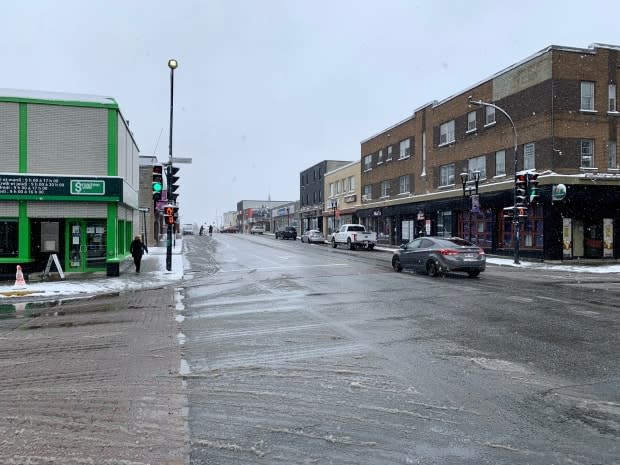How one region in hard-hit Quebec has so little COVID-19 it can hold a film festival
The road blocks cutting Rouyn-Noranda off from the rest of the world went up on April 4. It's the sort of thing that leaves a lasting memory.
"If I'm remembering correctly, we were one of the first cities to be totally confined ... my parents live in Val d'Or and it felt like a wall had gone up overnight. Nobody could come in or out," said Émilie Villeneuve, a longtime resident of the area.
Coronavirus was spreading. Case numbers were increasing. Something needed to be done, and fast.
But spring feels very far away these days in Abitibi-Témiscamingue, and not just because of the dusting of snow.
On Thursday, the region reported a single new case of COVID-19. After four straight days of goose eggs, and one where a case was wiped off the board as a false positive, this was not news to be greeted warmly.
"It's almost like there's a movement to protect the yellow," laughed Villeneuve, who is the executive director of the region's annual film festival.
You might say they've done a decent job of it. There are currently eight active cases in the region.

Unlike the three regions that border it to the south and east (Outaouais, Laurentides and the Mauricie), in Abitibi-Témiscamingue bars and restaurants are open and people are mostly going about their daily lives, just with masks and more distance.
More crucially, the movie theatre is open.
And though it won't quite be full for this weekend's kickoff of the Festival de cinéma international en Abitibi-Témiscamingue, there will be actual people occupying actual seats in the Théâtre du Cuivre.
There won't be as many of them as in a typical year — 140 capacity instead of 725 — and they'll be spread out, COVID-19 oblige, but that's okay.
"We may not be able to be close physically, but that doesn't mean you can't be close emotionally, to share feelings even at 1.5 metres," said Villeneuve.
Soon headed back to green?
Only five of Quebec's 17 administrative regions are currently drawn in yellow, or the pre-alert stage, on the provincial government's colour-coded COVID-19 map.
It's probably not a coincidence all are in the north of the province. But none of the other four are as populous as the Abitibi. And now there's talk it could soon go back to green.

So what has the region got right that many others haven't?
Geography surely plays a part, but other thinly populated, far-flung regions haven't been as fortunate.
Perhaps demography has a role in all of this too. The median age in Abitibi-Témiscamingue is nearly 10 years younger than it is in the Gaspé, for instance.
There may be a structural element to it as well.
The Eastern Townships, or Estrie, has also done well, remaining an orange zone. Restaurants are still open, as are movie theatres.
The region credits the integrated civil emergency committee put in place in the aftermath of the Lac Mégantic rail disaster in 2013 for its ability to react quickly and hold the line against COVID-19.
Another theory, put forth earlier this month by Dr. Eric Eleko, a public health specialist with the James Bay regional health authority, is that folks in more remote areas tend to be acutely aware of how fragile the health system is, and of the consequences of becoming seriously ill. A medical emergency often involves an air ambulance and a lengthy stay away from home.
But one of the people leading the fight against coronavirus in the region, Dr. Omobola Sobanjo of the CISSS de l'Abitibi-Témiscamingue, has a more prosaic explanation: people are mostly interested in following the rules.
"We often get questions about events that people want to hold, and that helps us bring specific recommendations in order to better set limits and hold those events in a safe manner," she told Radio-Canada.
A banner year for premieres
One of those events is the film festival.
Villeneuve said this year's financials will include a new line item: personal protective equipment for staff, volunteers and guests. But it's a small price, all things considered.
The Abitibi festival doesn't generally have any trouble attracting entries to its judged competitions, or filling out its schedule with sought-after films and directors, but this year is different.
Fifty-two films will premiere at the 2020 event, twice as many as last year. It's good to be the only game in town.
"There's usually a fair bit of excitement and restlessness but this year it's been transferred, there are a lot of artists who have told us 'we're dying to see people see our films, I just want to see a reaction'," Villeneuve said.
The roster of invitees this year will be more modest than in past years, but they will be looked after in the manner to which they've become accustomed, which Villeneuve describes as part summer camp, part "all-inclusive resort in the North".

Several of them, including celebrity director Philippe Falardeau, who is showing his new feature film, My Salinger Year, will be arriving from so-called 'red' zones. Thus, they will be confined to a bubble of sorts.
But the how matters less than the what.
There will be movies. In front of an audience. What a concept.
"We're hoping to send some positive energy from our yellow region to the red ones," Villeneuve said, later adding "we're like the Montreal of the future. Yes, one day soon you'll be able to get together again. Yes, one day soon you'll see a film on a big screen. If that helps the less fortunate regions, then we're happy to be able to do it."

 Yahoo Finance
Yahoo Finance 